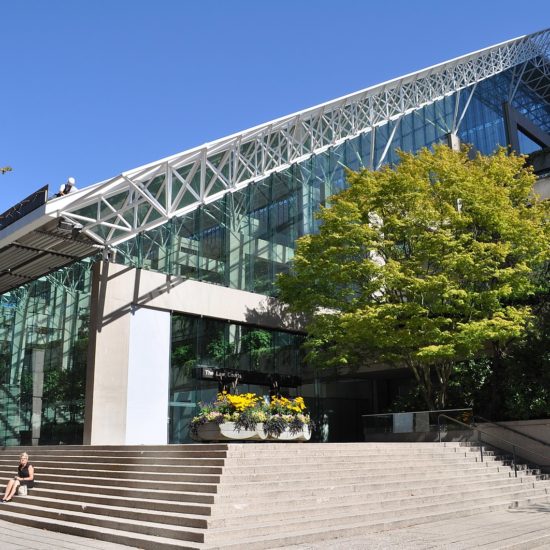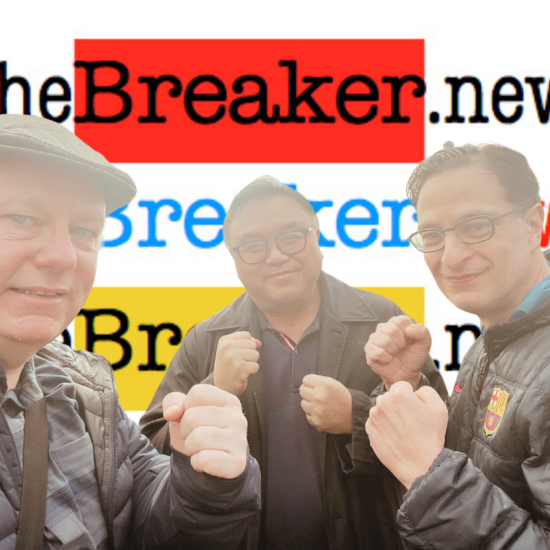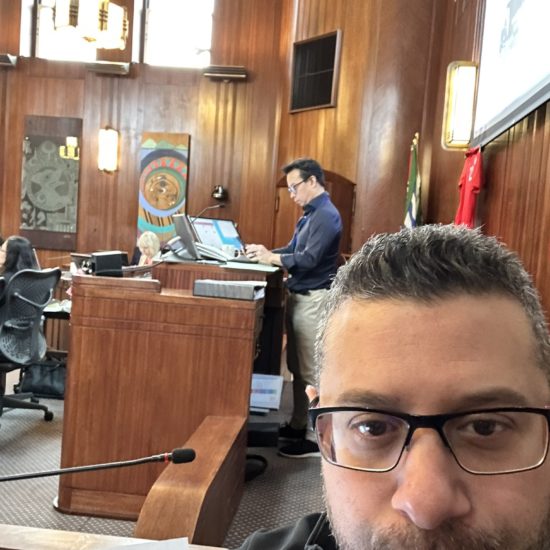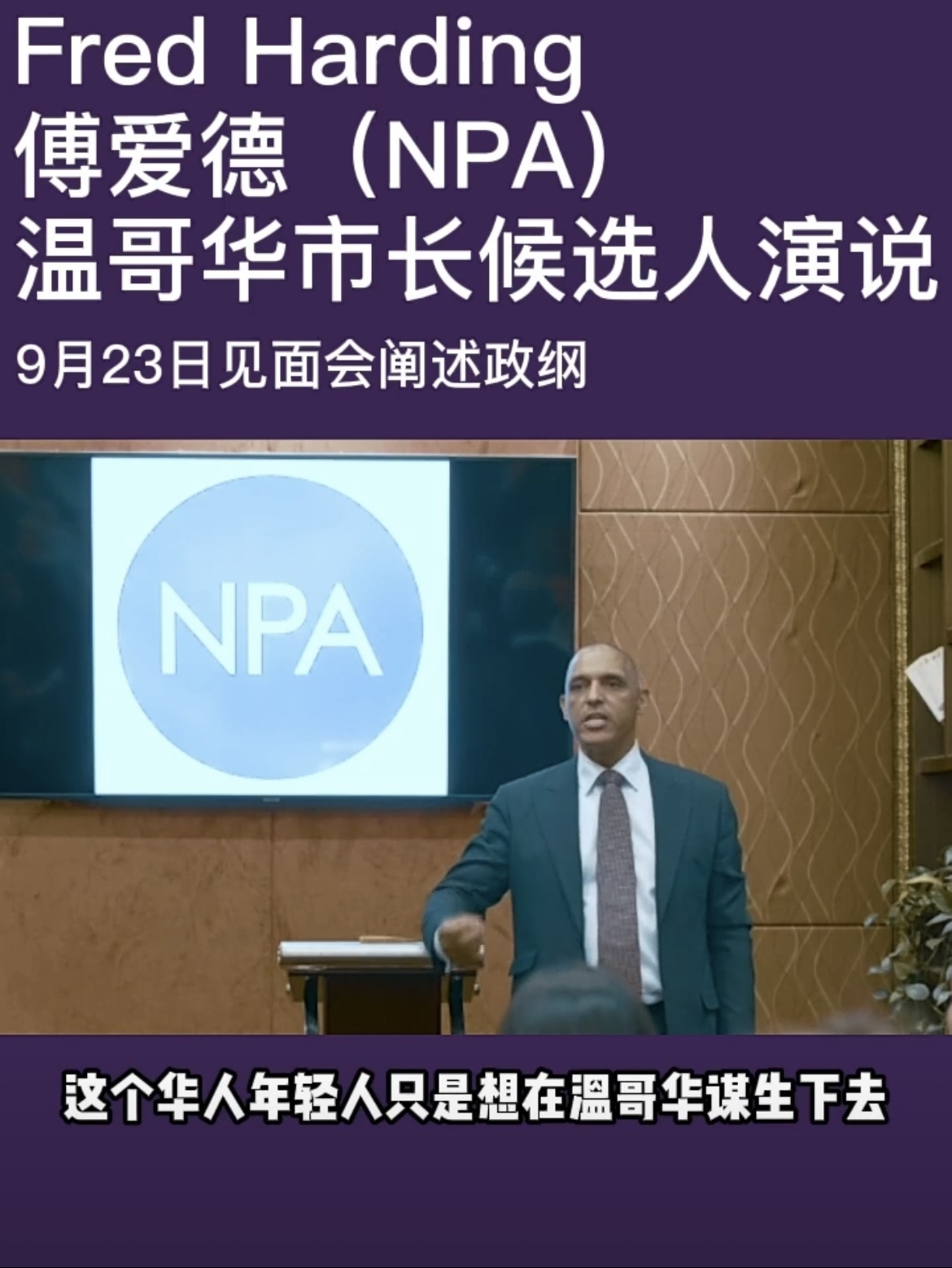
Bob Mackin
The most publicity the NPA campaign received since original mayoral candidate John Coupar quit in early August came Sept. 16.
A Provincial Court judge allowed 10 NPA candidates, including replacement Fred Harding, to use versions of their names in Chinese characters beside their names on the civic election ballot. Only one of the 10 was born with a Chinese name.

Fred Harding outside the T&T Chinese supermarket in South Vancouver on Oct. 9 (NPA/Twitter)
The judge decided he needed more time to hear city hall’s legal challenge, but that couldn’t happen until after the Oct. 15 election.
Harding said he used a Chinese name on a daily basis. He retired from more than 30 years in policing, moved from Burnaby to Beijing in 2017 and runs a trade consultancy in China. There he lives with wife Zhang Mi, a popular singer who overcame cancer and released a song in 2021 to celebrate the Chinese Communist Party’s centennial.
Harding returned to Vancouver in late August to take a second run at the mayoralty. In 2018, with Vancouver 1st, he finished sixth with 5,640 votes while staying at a rented house on Birch Street in Marpole. This time, he is staying downtown at the Telus Garden luxury condo tower while eyeing the top office at 12th and Cambie.
Even before Coupar’s surprise departure, the party was reeling financially. A B.C. Supreme Court judge ruled July 20 against seven NPA members who sued Mayor Kennedy Stewart for defamation over a January 2021 news release. Stewart’s lawyer argued Stewart was justified in alleging NPA ties to the alt-right and had the case thrown out under the Protection of Public Participation Act. The plaintiffs could together owe $100,000 or more in legal costs.
Needless to say, the NPA can’t afford to advertise like the well-financed Forward Together and ABC Vancouver machines, but it is making an 11th hour push. The party waited until Thanksgiving weekend to buy radio ads on CKNW. Instead of attacking Stewart and his party, the NPA is zeroing in on ABC leader Ken Sim, the 2018 mayoral runner-up with the NPA. That theme extended to Chinese newspaper ads, calling ABC “A Bad Choice” with a sub-headline warning “Beware of Ken Sim.” Harding took to both WeChat and Facebook on Oct. 12, in a video post titled “Fred Harding is asking for help in Chinese.”
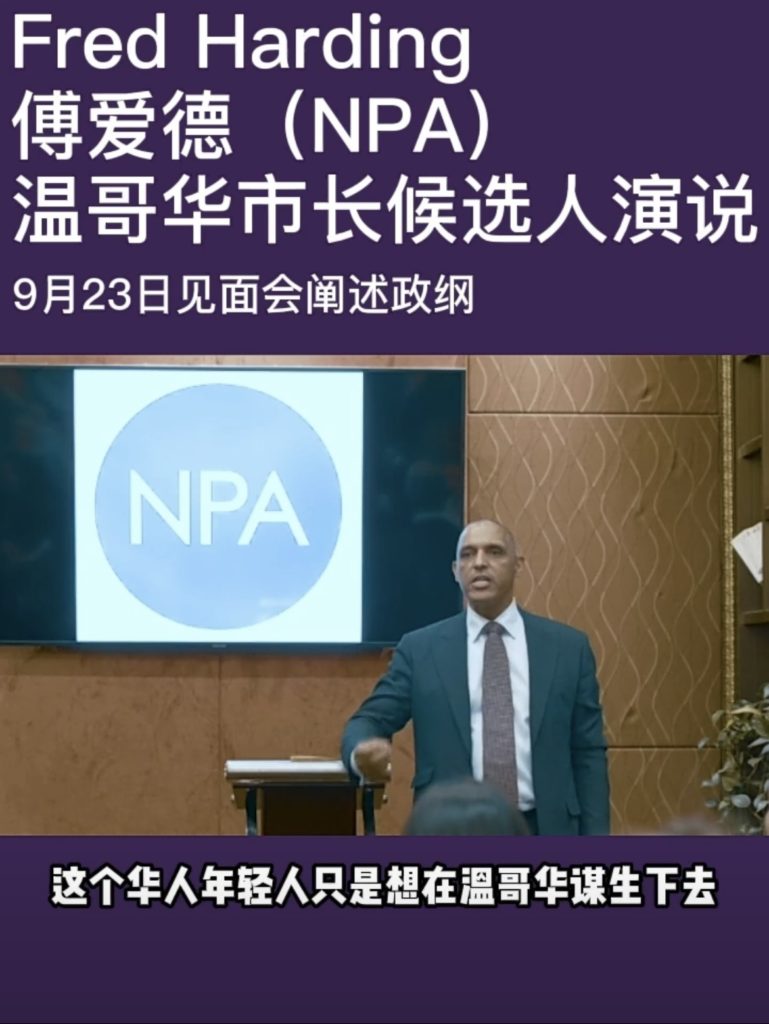
Image from WeChat video of Sept. 23 Fred Harding campaign event (NPA/WeChat)
“Ken Sim wants to make drugs legal in the city. We will have more misery,” said the translation from Mandarin. “Kennedy has failed all of us. I am promising to clean up the city.”
Under Harding, the party is primarily targeting Chinese-speaking voters and donors with its law and order message and using an account on the WeChat app, which boasts more than 1.24 billion users, to recruit and organize volunteers. Harding told an internal party meeting on Sept. 10 that the campaign would rely on Chinese students.
He headlined an event at the upscale Neptune Palace Chinese Seafood restaurant on Sept. 23. With the purple NPA logo projected on a screen, Harding passionately spoke to supporters.
“Over one week ago, a young man who was delivering food for Skip the Dishes, he’s making minimum wage, had his throat cut on the street. He’s a young Chinese youth who’s trying to make a living in Vancouver. I’m here for that man,” Harding said.
“The people that are there, have been suffering and assaulted. Race hate crimes, I’m here for the victims of race hate crimes!”
A 26-year-old man suffered stab wounds to his neck and chest on Sept. 11 in Chinatown while delivering food.
Except, he is not Chinese.
Global News aired an interview with the victim on Sept. 26. His name is Hamidullah Habibi and he came to Canada this year from Afghanistan. Dennis Amanand Prasad was arrested Sept. 12 and charged with aggravated assault.
Harding has not responded to requests for comment about the video, published Sept. 27 on WeChat and re-published Oct. 7 on Facebook, where it had received more than 12,000 views as of Oct. 12.
Did the former police department spokesman intend to mislead potential voters and donors or did he just not do his homework?
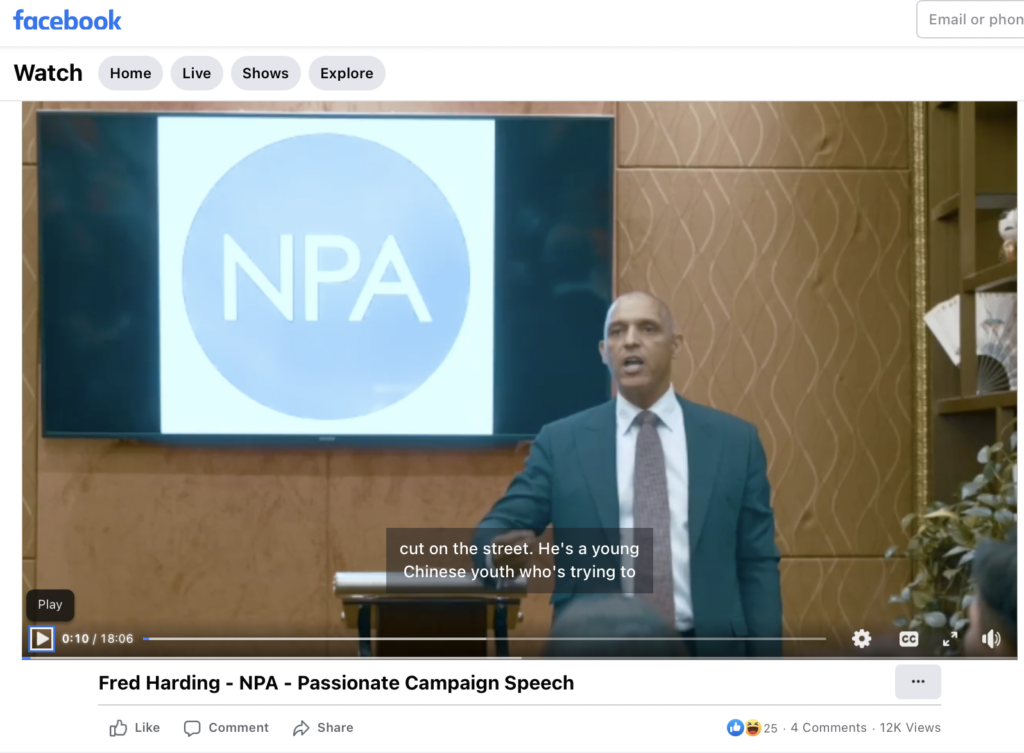
Image from Facebook video of Sept. 23 Fred Harding campaign event (NPA/Facebook)
“Given his background, I would say that he’s very manipulative, because he is applying his PR and communication skills in the wrong way, or a very self-serving way,” said Fenella Sung of the Canadian Friends of Hong Kong.
Sung said Harding’s words could “incite anxiety and fear among a particular ethnic minority group that is very vulnerable, especially those in Chinatown areas.
“I think this kind of campaigning is malicious,” she said.
The full, 18-minute video of Harding’s speech appears on his “FredHardingFans” WeChat channel, which was run from a Beijing IP address until last week. As of Oct. 11, the video had received 70 thumbs up and 126 hearts from viewers. It had been forwarded to 786 others and there are eight comments underneath from users in Beijing and three other Chinese regions.
“I believe that if Fu Aide [Harding’s Chinese name] is the mayor, public security management will be a big step forward,” wrote a user from Guangdong. “If the community is stable, the economy will develop more smoothly, and the people will be safe.”
WeChat is like a combination of Facebook, Instagram and Twitter with a digital wallet function thrown in. But it is also subject to manipulation by the Chinese government, which censors dissenting content and amplifies messages that favour the party.
“New immigrants from China in Canada, they are still pretty much influenced by the Chinese government through this software,” said McGill University professor of information studies, Benjamin Fung. “Immigrants here in the physical world, they are still interacting with the Canadian society, but once they pick up their smartphone, [they] basically go back to China. It’s like a comfort zone for them.”
Fung, who is also the Canada research chair in data mining for cybersecurity, said Chinese-speaking immigrants used to rely on local media outlets, but that changed with the advent of smartphones and the rise of WeChat.
Similar to Western social media, WeChat has become a haven for disinformation. During the 2021 federal election, domestic and foreign accounts successfully swayed voters against Steveston-Richmond East Conservative Kenny Chiu. They falsely claimed the incumbent’s proposed foreign agents registry law would suppress pro-China opinion and lead to surveillance of Chinese in Canada. Chiu’s private member’s bill actually resembled a kind of lobbyist registry, similar to one in the U.S. that applies to any foreign nationality.
“Sometimes the government, a state-sponsored organization, at the back end at the recommender system [software that predicts user activity], they may try to input a few pieces of disinformation or try to promote some candidates in the election in order to influence some of the voters in Canada,” Fung said. “And this is especially true for the Chinese community.”
In the University of Toronto’s May 2020 Citizen Lab report, “We Chat, They Watch: How international users unwittingly build up WeChat’s Chinese censorship apparatus,” researchers found “WeChat communications conducted entirely among non-China-registered accounts are subject to pervasive content surveillance that was previously thought to be exclusively reserved for China-registered accounts.”
WeChat, owned by Chinese tech giant Tencent, is beyond the reach of Canadian regulators. Fung said a foreign agents registry would help. So would an office like the U.S. State Department’s Global Engagement Center. Its mission is to monitor, expose and counter foreign state and non-state propaganda that aims to undermine or influence the U.S. and its allies.
“I think Canada should do the same,” Fung said. “They will actually look into the case and translate them into English and then try to make an official announcement on behalf of the government to let the voters know.”
In one recent case, the Global Engagement Center report on China’s efforts to manipulate global opinion on Xinjiang said: “The PRC works to silence dissent by engaging in digital transnational repression, trolling, and cyberbullying.”
Harding has also not responded to questions about his Hong Kong-registered, Beijing company, Harding Global Consultants, and whether it has contracts with or debts owing to anyone connected to the Chinese government.
Support theBreaker.news for as low as $2 a month on Patreon. Find out how. Click here.






